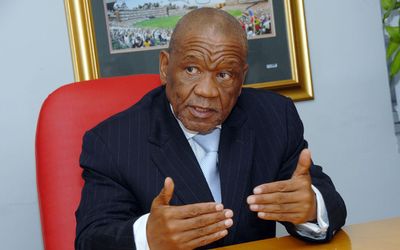Lesotho wants recruitment of miners reviewed
by Khulekani Magubane and Nicholas Kotch,
2012-10-19 10:12:20.0
THE prime minister of Lesotho called on Thursday for the re-examination of the collapsed system of recruiting Basotho miners into South African mines.
Tom Thabane said the relationship between the two countries was of paramount importance but that the arrangement for Basotho miner recruitment made in the past had collapsed. He said there was a case for a return to stronger regulation.
"Wherever there is a big economy, the smaller economies surrounding it will go there to look for work. We can’t just look for work in a disorganised way," Mr Thabane told Business Day in an interview after holding talks with President Jacob Zuma.
Lesotho had casualties in the violent wildcat strikes that have swept the mining sector this year, specifically during the killings at Lonmin’s Marikana mine in August where police shot dead 34 strikers.
The Lesotho high commissioner in Pretoria, Lineo Ntoane, estimated that there were 44,000 Basotho miners working in South Africa, about 10% of South Africa’s total mining industry workforce. She said four of the 34 miners killed by police at Marikana were Basotho.
"Of the four that died, one was not even employed by the mine. The other three were employees of the mine and the regulation and practice of the mine is that an unprotected strike would not be made eligible for compensation," Ms Ntoane said.
She said Lonmin made provision to compensate family members of Basotho mineworkers killed.
"The Lonmin management made a special dispensation on the matter and decided that it would be treated like a mine accident and therefore pledged that they would do everything related to compensation," Ms Ntoane said.
She said Lonmin committed to financially covering children of the deceased mineworkers right up to tertiary education.
They also committed to cover 100% of burial costs.
Mr Thabane added that South African mines historically recruited many skilled shaft sinkers from Lesotho. "We are the best shaft sinkers. In Marikana we sank the shafts. It’s our skill and we have to sell it and get a price for it."
He said that in the past the Native Recruitment Corporation used to work well in recruiting Basotho miners to South Africa.
"There are some elements in there that are very useful. In fact, in Lesotho we made an arrangement that part of the miners’ remittances must be banked in Lesotho so that when the contract ended they would go home and find some money that would be safe there … it was done in the past and I think we can agree to it again," he said.
"In a limited way there were agreements between us and South Africa on how miners would come here and under what conditions they would work," he said.
Mr Thabane said Lesotho and South Africa had not begun formal talks over the unrest in the mining sector, but he believed some form of engagement was necessary.
He said the South African economy could not afford lengthy work stoppages and that it was important that South Africa watch the clock in the "bad economic climate".
The call to re-establish recruitment systems is not expected to sit well with local labour due to sentiments from South African mining communities, who want mining companies to employ local and nearby people instead of getting foreign labour.
Meanwhile, a South African government communiqué said Mr Thabane briefed Mr Zuma on Lesotho’s developing food crisis.
Mr Zuma pledged humanitarian help in easing the crisis, in arrangements to be announced later.
Mr Thabane said the country would look at upgrading its food production.
The two leaders agreed that Lesotho and South Africa should work more closely together, and that the next bilateral meeting should be held early next year.

Lesotho Prime Minister Tom Thabane. Picture: ARNOLD PRONTO
THE prime minister of Lesotho called on Thursday for the re-examination of the collapsed system of recruiting Basotho miners into South African mines.
Tom Thabane said the relationship between the two countries was of paramount importance but that the arrangement for Basotho miner recruitment made in the past had collapsed. He said there was a case for a return to stronger regulation.
"Wherever there is a big economy, the smaller economies surrounding it will go there to look for work. We can’t just look for work in a disorganised way," Mr Thabane told Business Day in an interview after holding talks with President Jacob Zuma.
Lesotho had casualties in the violent wildcat strikes that have swept the mining sector this year, specifically during the killings at Lonmin’s Marikana mine in August where police shot dead 34 strikers.
The Lesotho high commissioner in Pretoria, Lineo Ntoane, estimated that there were 44,000 Basotho miners working in South Africa, about 10% of South Africa’s total mining industry workforce. She said four of the 34 miners killed by police at Marikana were Basotho.
"Of the four that died, one was not even employed by the mine. The other three were employees of the mine and the regulation and practice of the mine is that an unprotected strike would not be made eligible for compensation," Ms Ntoane said.
She said Lonmin made provision to compensate family members of Basotho mineworkers killed.
"The Lonmin management made a special dispensation on the matter and decided that it would be treated like a mine accident and therefore pledged that they would do everything related to compensation," Ms Ntoane said.
She said Lonmin committed to financially covering children of the deceased mineworkers right up to tertiary education.
They also committed to cover 100% of burial costs.
Mr Thabane added that South African mines historically recruited many skilled shaft sinkers from Lesotho. "We are the best shaft sinkers. In Marikana we sank the shafts. It’s our skill and we have to sell it and get a price for it."
He said that in the past the Native Recruitment Corporation used to work well in recruiting Basotho miners to South Africa.
"There are some elements in there that are very useful. In fact, in Lesotho we made an arrangement that part of the miners’ remittances must be banked in Lesotho so that when the contract ended they would go home and find some money that would be safe there … it was done in the past and I think we can agree to it again," he said.
"In a limited way there were agreements between us and South Africa on how miners would come here and under what conditions they would work," he said.
Mr Thabane said Lesotho and South Africa had not begun formal talks over the unrest in the mining sector, but he believed some form of engagement was necessary.
He said the South African economy could not afford lengthy work stoppages and that it was important that South Africa watch the clock in the "bad economic climate".
The call to re-establish recruitment systems is not expected to sit well with local labour due to sentiments from South African mining communities, who want mining companies to employ local and nearby people instead of getting foreign labour.
Meanwhile, a South African government communiqué said Mr Thabane briefed Mr Zuma on Lesotho’s developing food crisis.
Mr Zuma pledged humanitarian help in easing the crisis, in arrangements to be announced later.
Mr Thabane said the country would look at upgrading its food production.
The two leaders agreed that Lesotho and South Africa should work more closely together, and that the next bilateral meeting should be held early next year.





























Post a comment